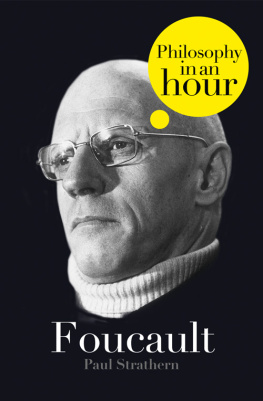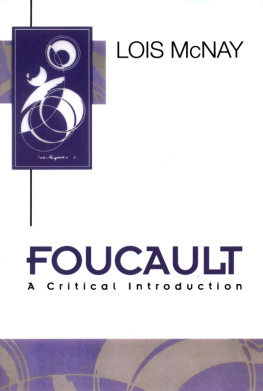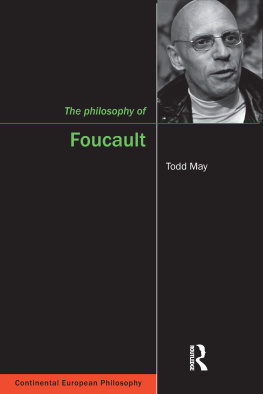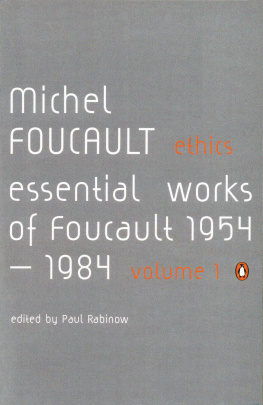Starting with Foucault
An Introduction to Genealogy
SECOND EDITION
C. G. Prado
A Member of the PerseusBooks Group
-iii-
All rights reserved. Printed in the United States of America Nopart of this publication may be reproduced or transmitted in any form or by anymeans, electronic or mechanical, including photocopy, recording, or anyinformation storage and retrieval system, without permission in writing fromthe publisher.
Copyright 2000 by Westview Press, A Member of the PerseusBooks Group
Published in 2000 in the United States of Americaby WestviewPress, 5500 Central Avenue, Boulder, Colorado 80301-2877, and in the UnitedKingdom by Westview Press, 12 Hid's Copse Road, Cumnor Hill, Oxford OX2 9JJ
Find us on the World Wide Web at www.westviewpress.com Libraryof Congress Cataloging-in-Publication Data Prado, C. G. Starting with Foucault:an introduction to genealogy / C.G. Prado. -- 2nd ed. p. cm Includesbibliographical references and index. ISBN 0-8133-9078-8 (alk. paper) 1.Foucault, Michel. 2. Genealogy (Philosophy) I.Title. B2430.F724 P73 2000 194 -- dc21 00-063319
The paper used in this publication meets the requirements of theAmerican National Standard for Permanence of Paper for Printed LibraryMaterials Z39.48-1984.
10 9 8 7 6 5 4 3 2 1
-iv-
Contents
Preface to the Second Edition | vii |
1 Foucault: Challenge and Misperceptions |
Necessary Scene-Setting , |
| | |
| 2 The Domains of Analysis |
| A New Analytic or an Old Relativism? |
| |
| The Development of Political Technology , |
| | | | |
| 5 The Manufacture of Knowledge |
| The History of Sexuality , |
| An Interim Recapitulation , |
| The Mechanics of the Will to Power , |
| Favored Perspective or Correct Account? |
| |
|
|
-v-
The Criterial Notion of Truth , |
| The Constructivist Notion of Truth , |
| The Perspectivist Notion of Truth , |
| The Experiential Notion of Truth , |
| The Tacit-Realist Notion of Truth , |
| | |
| The Specter of Irrealism , |
| Setting the World Aside , |
| |
| 8 Novel Construals and Cogency |
Innovative Visions and Periods , |
| Unifying Factors: History , |
| Unifying Factors: Subjectivity , |
| | |
|
|
|
|
-vi-
Preface to the Second Edition
Five years ago I tried to present Foucault's genealogicalanalytics as clearly as I could in the first edition of Starting withFoucault: An Introduction to Genealogy. 1My targeted audiencewas philosophers and philosophy students in the Anglo-America.analytictradition. In my experience, too many members of this group simply do notbother to read Foucault, much less engage with his ideas, because of agenerally negative impression and the strong tendency to lump him in withvarious "postmodernists." From what I have been told by students, colleagues,a few readers who have written me, people met at conferences, and not leastWestview Press's reviewers, the first edition was quite successful. But aftermore than five years, I think it needs updating. For one thing, I have used thebook in my classes and it is surprising how student response to it has changedsince its publication. At that time, few of my students had encounteredFoucault. Now students read or read about Foucault in their Political Sciencecourses, Sociology courses, Women's Studies courses, Cultural Geographycourses, Film courses, and even Commerce and Business courses. More importantis that, like other intellectual innovators, Foucault's ideas have been"appropriated" and are now widely used in diverse contexts and ways.Often they are used with only the most cursory gesture toward their source andwith the barest grounding. As a colleague, Bryan Palmer, remarked to me,Foucault is the most referred to and most pirated from but least readcontemporary thinker.
The widespread appropriation of philosophical ideas is hardlynew. For instance, the notion of a social contract is extensively and variouslyused without reference to Thomas Hobbes. It is a mark of the importance of newphilosophical ideas that they are integrated into common thought and achieve akind of transparency and anonymity. Foucault's ideas, especially his notion ofpower, are now taken for granted by many. "Power" may be employed bya cultural geographer concerned with how use of space defines minorities, by afeminist concerned with patriarchal shaping of identities, or by anorganizational behaviorist concerned with how institutional hierarchies affectthe implementation of policy. What is interesting is that Foucault's notion ofpower is seldom discussed, much less used, by academic philosophers in theAnglo-American analytic tradition. This has
-vii-
changed little since publication of the first edition. Too manyNorth American universities still offer more courses on Foucault outside theirphilosophy departments than in them. Even where one would expect seriousengagement with Foucault's ideas there tends to be a kind of diminishment ofhis importance. The main reason for this lack of engagement is perception ofFoucault as a radical relativist and irrealist. That is, analytic philosopherssee Foucault as leveling all claims and as denying any reality outside ofconsciousness and language.
Next page











